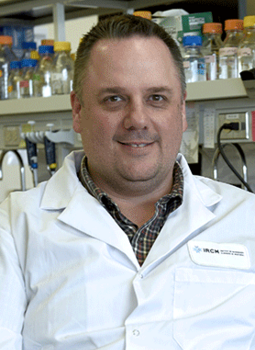Promising new research on aggressive breast cancer
- UdeMNouvelles
07/13/2021
Researchers Jean-François Côté and Marie-Anne Goyette explain how a new therapeutic target works to fight a very aggressive form of breast cancer.
Better treatments of HER2-positive breast cancer are closer at hand, thanks to new research by a team led by Université de Montréal professor Jean-François Côté at the cytoskeleton organization and cell-migration research unit of the UdeM-affiliated Institut de recherches cliniques de Montréal (IRCM).
In HER2-positive breast cancer, a gene called HER2 is expressed that promotes an aggressive form of the disease. Affecting 20 per cent of women suffering from breast cancer in Canada, the HER2-positive subtype is associated with a poor prognosis.
Published in PNAS, the journal of the U.S. National Academy of Sciences, the new research by Marie-Anne Goyette, a doctoral student in Côté’s laboratory, reveals a highly promising therapeutic target to counter the HER2-positive breast cancer.
We asked Côté and Goyette to tell us more.
Why was it important to study HER2-positive breast cancer?
J-F. C: What compromises the survival of cancer patients is the capacity of tumour cells to spread and metastasize to other organs, thus interfering with vital body functions. For us, it became imperative to look at HER2-positive breast cancer, because it is among the most aggressive and is more likely to spread. Despite the availability of targeted treatments, relapses are frequent for a significant proportion of patients.
Tell us about your research and the novelty it brings.
M-A.G.: We observed a known phenomenon called hypoxia, present in HER2-positive cancers. Hypoxia is manifested by a lack of oxygen caused by the rapid growth of the tumour. This phenomenon leads to the production of metastases, weakening of the immune response against the tumour, and provoking resistance to treatment. In short, hypoxia makes tumours more aggressive, while reducing the body's ability to defend itself.
In a preclinical model, our team demonstrated that the presence of a protein called AXL was crucial in hypoxia. By blocking the action of this protein in the tumour, we observed blood vessel recovery and a revitalization of the immune system surrounding the tumour. This in turn reduced the tumour's ability to metastasize.
It is as if we had succeeded, on the one hand, in breaking down the protective walls of the tumour against the immune system, thus making it more vulnerable to immunological treatments, and, on the other hand, in preventing the tumour from moving elsewhere.
What makes this discovery promising?
J-F.C.: With the latest scientific advances in cancer, immunotherapy and personalized medicine have generated a lot of hope. However, for HER2-positive patients, the results to date have been inconclusive, and that’s why it’s important to better understand the immune environment surrounding this type of tumour. Indeed, it’s fundamental that the mechanisms and factors involved be identified to help better target treatments and those most likely to respond to them.
This is exactly what we did. We have not only shed light on a central mechanism of the functioning of some of the most aggressive tumours, but in doing so we have also unveiled a way to create an environment conducive to more effective treatment. The therapeutic potential of this study is highly significant for future clinical management of these cancers.
What brought you to this research approach?
J-F.C.: Our laboratory has been working on breast cancer for several years – specifically, on cell migration that leads to metastases – in search of new solutions. The latest advances in immunology are spectacular, but many questions remain, especially with regard to resistance to treatments. We had the expertise in molecular research to help address these barriers. Working on hypoxia appeared to be a very promising avenue that needed to be explored.
What are your hopes for the future?
M-A.G.: We hope that this study will lay the groundwork for new effective therapies for HER2-positive cancers. We also hope that it will inspire other researchers to examine other unknown aspects of the immune environment of cancers, in order to broaden current knowledge and ultimately improve patients’ chances of survival.
About this study
“Targeting Axl favors an anti-tumorigenic microenvironment that enhances immunotherapy responses by decreasing Hif-1a levels” by Marie-Anne Goyette et al. was published July 12, 2021 in PNAS. Funding was provided by the Canadian Institutes of Health Research and their foundation, the Canadian Cancer Society, the Quebec Health Research Fund, the Quebec Cancer Foundation, the National Institutes of Health and the Transat Chair in Breast Cancer Research. This study was also made possible thanks to the collaboration of experts from Yale University, Université de Montréal, McGill University and Université Laval.














